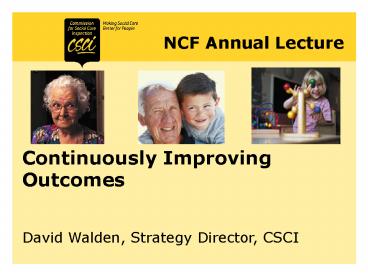NCF Annual Lecture - PowerPoint PPT Presentation
1 / 18
Title:
NCF Annual Lecture
Description:
90% of rescare and 60% of domiciliary care provided by the independent sector ... Dispelling myths. Myth One 'We will be left alone for 3 years' ... – PowerPoint PPT presentation
Number of Views:32
Avg rating:3.0/5.0
Title: NCF Annual Lecture
1
NCF Annual Lecture
Continuously Improving Outcomes David Walden,
Strategy Director, CSCI
2
A pluralist market
- 90 of rescare and 60 of domiciliary care
provided by the independent sector - Corporate providers have under 25 of the market
- Rest are mainly 1 or 2 home providers
- At least 30 of people fund their own care
- 5 million informal carers 1 million care for
over 50 hours a week
3
Influences on the quality of services
- What people tell us about their
experiences of services, and what they want - How providers run services
- How councils commission services
- How the market operates how money flows into
the sector - How the regulator behaves
4
What do people tell us they want
- Independence
- Choice
- Flexible services
- Consistency
- Competent, courteous staff who make them
- feel safe
5
What do people tell us they want
The main point is that you should be able to
make your own decisions depending on what level
you feel safe at. You spend your whole life
making decisions about things, your work,
your relationships, your children, you dont
want to suddenly give up that responsibility
because youre older. Social services dont
see you as an individual. They tell you what you
want, but dont listen to what you really
want. Its not my home, its their
institution.
6
Providers
- On average, care homes in England meet 72 of
- the national minimum standards
- 59 in 2002/03
- Top performers make
- up 22
- 3 years ago this figure
- was just 7
7
Commissioners
- Need to take a long-term view
- Need to take peoples views and preferences more
into account - Need good business development and IT
- Commissioners should recognise their
responsibilities for whole community
8
Operation of the market
- OFT report Care Homes for Older People in the
UK - Kings Fund Inquiry report The Business of
Caring - Any increase in individual budgets will need to
be accompanied by - Investment in market development to
strengthen consumer power, support growth and
diversity in the market, and create incentives to
provide high-quality services
9
Inspecting for Better Lives I
- Follows the key principles of good regulation
- Proportionate
- Accountable
- Consistent
- Transparent
- Targeted
10
Inspecting for Better Lives II
- 2005
- New report format
- New ways of seeking peoples views
- More ways for people to contact us directly
- Clearer, simpler registration
- Better risk-assessment
- More resources for inspecting poorly-performing
services - More unannounced inspections
- April 2006
- Variable frequency of inspection based on
risk-assessment - Annual provider quality assurance assessments
- Improvement plans for poor services
- April 2007
- Regulations and NMS more clearly outcome-focused
11
In future - Inspectors will
- Annually assess the quality of a particular
service - Use an interactive record of evidence to monitor
- service quality
- Make greater use of information from complaints
- Decide the frequency and focus of inspection
- Undertake inspections, including themed
inspections - Concentrate on improving under-performing
- services
12
In future service users will have
- More opportunities to express their views and
- describe their experiences
- Greater awareness of our assessments
- Confidence that inspectors could arrive at any
time
13
In future commissioners will
- benefit from
- Clearer reports
- Judgements based
- on outcomes
- Detailed analysis of the quality of services
that they are commissioning - Better information on market trends in their
area
14
In future providers will have
- Fewer inspections if you are providing
high-quality services - An annual quality assurance self-audit to
support your quality management, which we will
validate and discuss - An assessment of your service that focuses on
outcomes
15
Dispelling myths
- Myth One We will be left alone for 3 years
- Myth Two There will only be inspections every
3 years - Myth Three CSCI will be less consistent
16
What will success look like?
- We have moved to a culture of improvement not
compliance - People who use social care services will have a
better experience and a stronger voice - Innovation will be rewarded and encouraged
- The sector will grow to meet increasing and
changing demands - People will be better able to plan their own
services
17
Conclusion
- Effective, innovative commissioning and service
- delivery is vital
- Role of the regulator
- Provide public assurance
- Drive up the quality of provision
- Challenge the performance of commissioners
- Provide information about the range,
- availability, quality and value for money of
- services
18
Contacting CSCI
- www.csci.org.uk
- Helpline 0845 015 0120
- Email enquiries_at_csci.gsi.gov.uk































